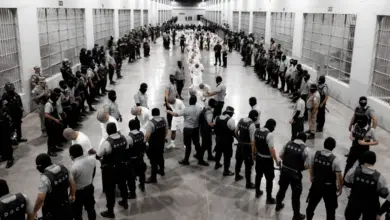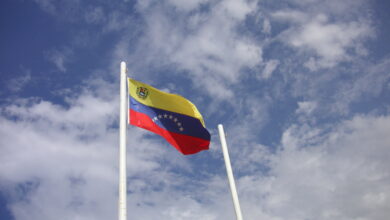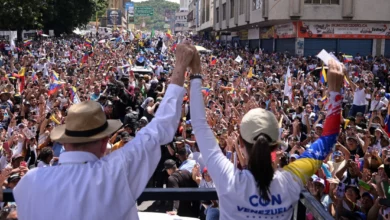I have not seen disparity between the rich and poor as much as I did in the South American cities Sao Paolo, Brazil and Caracas, Venezuela. In the Venezuelan capital, rich communities have, over decades, effectively extricated themselves from society and now live on protected property away from regular interaction with the impoverished majority.
With wealth pooled so tightly in the hands of a slim minority–who acquired their fortunes in a wave of aggressive neoliberalization of all industries, starting in the 1970s and continuing to this day–the majority’s socioeconomic conditions have deteriorated under a two-pronged failure of an underfunded, weakened, and bloated government bureaucracy and the inability and disinterest of the private sector to absorb or train an undereducated, unskilled, undermotivated, and desperate majority.
This socioeconomic rift in the Bolivarian republic was precipitated by a growing isolation of the wealthy who became less inclined to hire from the ranks of the poor, contributed less to charities, and overwhelmingly subscribed to the capitalist logic of “effort begets wealth,” evidenced by a few tokenistic examples of “rags to riches” stories from the time of aggressive privatization. Gated communities, surrounded by impenetrable walls, armed security, barbed wire, and watchtowers rose to house the rich in the Venezuelan cities of Caracas, Valencia, and Maracaibo. The compounds, created to “protect their way of life,” were akin to the expatriate refuge compounds in Saudi Arabia, where a cultural enclave can be sustained outside the purview or judgment or desire of the conservative public.
Instead, the Venezuelan elite created their worst nightmare. The self-fulfilling prophecy of a jealous middle and lower class materialized as crime ran rampant in the cities. The upscale Bantustans of the rich precipitated ghettos at their seams. The wake-up call came when elections brought socialist leader Hugo Chavez to power, a man who rode the discontentment of the hungry masses by vowing to reverse policies that protect the rich, to nationalize the oil industry, and redistribute the country’s wealth.
Today the lifestyle of the wealthy still mirrors those of the Venezuelan elite before the rise of Chavez—with one minor difference, concern. On a recent visit to the country’s beautiful islands and affluent Caribbean playground of Moroccoy (a place not unlike Marina in Egypt) on a friend’s speedboat, I was privy to many conversations about the country’s political situation. While many of the rich remain rich, in the past they had nothing to complain about because the poor majority was comfortably invisible. Today, Chavez’s fiery rhetoric of socialism and tightening grip on the elite has made their lavish beach excursions far less carefree.
Today Egypt is looking more like Venezuela of the early 1990s. The latest statistics show that 22 percent of Egyptians are unemployed; that means that more than 1 in 5 Egyptians is jobless. Ahead of Ramadan, the price of wheat was said to increase by 20 percent and the cost of meat by 35 percent in what Mohamed El-Barghouthi described as a system of government sabotage against wheat producers in favor of the importers.
Not unlike Venezuela, summers in Egypt are often accented by the mass migration of Cairenes to coastal vacation spots on the beaches of the Mediterranean Sea, known commonly as “Sahel.” Eleven years ago, housing expert Eng. Milad Hanna described Sahel as an exquisite coast, “[a] 'delicious fillet steak' [which] has been devoted to a certain class of people and some professional syndicates, leaving no space for public beaches, turning the coastline into a copy of the Great Wall."
To this day, Sahel’s “Great Wall” still stands. The massive development of infrastructure and services on the North Coast are often thought to be a sign of upward mobility since the number of units across one hundred villages and resorts can accommodate over a million beach revelers (certainly more than the percentage of wealthy in the country). However, this is not necessarily the case, because the exponential growth of the coast has not meant that a larger proportion of the population now owns property between Alexandria and Marsa Matrouh. Rather, it is the same 10-15 percent of the population that now owns multiple chalets, villas, and palaces, most of which were acquired as real estate investments in a market that continues to appreciate; the growing options only exist to ensure exclusivity.
It is not uncustomary for members of the Egyptian upper crust to own villas in Marina, Hacienda, and perhaps one of the older, less trendy spots like Aida, Marakia, and Marabella, or a smaller and more secluded (and hence less eventful) resort. These properties are juggled by the economic elite every season depending on their needs—privacy vs. commotion, exclusivity vs. accessibility, opulence vs. modesty, and activity vs. tranquility. These shifting needs will affect the decision to buy, sell, rent, or let the properties ripen. All this is governed by the one rule of “cost is demand.”
Nowhere is this more obvious than the new EMAAR project Marassi (formerly Sidi Abdel Rahman), an ultra-exclusive resort destined to be the next Marina. The grounds, which resemble one of the new university campuses in the Gulf, house two dance clubs which are more exclusive than those frequented by Jay-Z and P. Diddy in the Big Apple. The clientele at these clubs are dressed to perform a pathetic caricature impersonation of western discotheques. Attempting to mimic dancers from Beyonce, Usher, and Rihanna music videos, the Egyptian elite, who dish out no less than 75LE for a shot of whiskey, would barely survive a mere stroll down any Cairo road. But then again, they need not worry about Cairo roads while enveloped by the “Great Wall.”
The weekend before Ramadan I found myself in a similar circumstance as in Moroccoy, aboard a heftily-priced boat in a bay, this time in Marina. As the speedboat wound its way through the artificial canals in Marina’s circuitous lakes, I could not get my mind off the plight of poor. The retail price of the boat I was on was likely no less than LE500,000. The fuel used to fill its tank could feed a poor family for a month, and it would take the average Egyptian’s full salary for 11 years to generate the cost of the boat. Not surprisingly, these contradictions never came up in the friendly exchanges on the boat. No one wanted to disturb the serenity of this bubble. One was to accept that we are evidence of a meritocratic Egypt, at least until my partner responded to the question of what she thought of the country after six months abroad by saying, “Egypt is in trouble.” She had disrupted the bliss of amnesia.
An good friend and scholar at the London School of Economics, who visits his home in Egypt every holiday season, expressed the contradictions any empathetic and socially-conscious member of the elite faces in his or her daily lives. Trapped between the intractable guilt when facing the poor and the repulsively-arrogant expressions of status among the consumption-obsessed wealthy, he said, “I cannot tolerate looking at either poverty or wealth in this country.”
What this colleague is pointing too is an inevitable byproduct of an increasingly kleptocratic environment. Given the exceptionally high level of corruption, collusion, and embezzlement in Egypt, much of the extravagant wealth in the country today raises unanswered questions. But the pressing questions are the most personal. When will the Egyptian upper class begin questioning their lifestyle? When will unhappiness, overload, anxiety, unfulfillment, and guilt at a blindingly-militant pursuit of more material come to an end? When will the unsustainable obsession with accumulating wealth and possessions falter? When will the rich in Egypt exhibit symptoms of affluenza?
Regardless of how high the walls they erect to hide from the realities of a failing state are, or how often they bounce from one coastal cocoon to the next to avoid the “undesirable” masses, or how few conversations they have about hunger and the price of wheat, Egypt’s wealthy are destined for a wake up call.
Adel Iskandar is a media scholar and lecturer at Georgetown University. His column appears every other Thursday.




